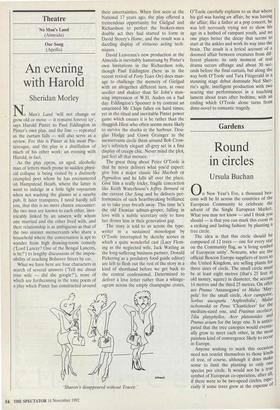Theatre
No Man's Land (Almeida) Our Song (Apollo)
An evening with Harold
Sheridan Morley
No Man's Land 'will not change or grow old or move — it remains forever icy', says Harold Pinter to Paul Eddington in Pinter's own play, and the line — repeated as the curtain falls — will also serve as a review. For this is Pinter at his most Pin- teresque, and the play is a distillation of much of his other work: an evening with Harold, in fact.
As the play opens, an aged, alcoholic man of letters much prone to sudden physi- cal collapse is being visited by a distinctly crumpled poet whom he has encountered on Hampstead Heath, where the latter is wont to indulge in a little light voyeurism when not washing the glasses at a nearby pub. It later transpires, I need hardly tell you, that this is no mere chance encounter: the two men are known to each other, inex- tricably linked by an unseen wife whom one married and the other lived with, and their relationship is as ambiguous as that of the two sinister menservants who share a household where the conversation is apt to wander from high drawing-room comedy (`Lord Lancer? One of the Bengal Lancers, is he?') to lengthy discussions of the impos- sibility of reaching Bolsover Street by car.
What we have here are four characters in search of several answers (`Tell me about your wife — did she google?'), none of which are forthcoming in the tone poem of a play which Pinter has constructed around
their uncertainties. When first seen at the National 17 years ago, the play offered a tremendous opportunity for Gielgud and Richardson to perfect the brokers-men double act they had started to form in David Storey's Home, and the result was a dazzling display of virtuoso acting tech- niques.
David Leaveaux's new production at the Almeida is inevitably hamstrung by Pinter's own limitations in the Richardson role, though Paul Eddington (here as in the recent revival of Forty Years On) does man- age to challenge the memory of Gielgud with an altogether different turn, at once seedier and shakier than Sir John's stun- ning impression of W.H. Auden on a bad day. Eddington's Spooner is by contrast an emaciated Mr Chips fallen on hard times, yet in the ritual and inevitable Pinter power game which ensues it is he rather than the thuggish Hirst who often seems more likely to survive the sharks in the harbour. Dou- glas Hodge and Gawn Grainger as the menservants circle them around Bob Crow- ley's infinitely elegant all-grey set in a fine display of creepy chic. Never mind the plot, just feel all that menace.
The great thing about Peter O'Toole is that he never delivers what you'd expect: give him a major classic like Macbeth or Pygmalion and he falls all over the place. Give him a really tricky, fragile concoction like Keith Waterhouse's Jeffrey Bernard or the current Our Song and he delivers per- formances of such heartbreaking brilliance as to take your breath away. This time he's the old Etonian adman-groper, falling in love with a nubile secretary only to have her drown him in their generation gap.
The story is told to us across the type- writer in a sustained monologue by O'Toole interrupted by sketchy scenes in which a quite wonderful cast (Lucy Flem- ing as the neglected wife, Jack Watling as the long-suffering business partner, Donald Pickering as a predatory food guide editor) are left to flesh out the rest of the story in a kind of shorthand before we get back to the central confessional. Determined to deliver a love letter rather than a whinge- ogram across the empty champagne crates, `Sharon's disappeared without Tracey.' O'Toole carefully explains to us that where his girl was having an affair, he was having the affair; like a father at a pop concert, he was left nervously trying not to show his age in a hotbed of rampant youth, and no one plays better the decay that seems to start at the ankles and work its way into the brain. The result is a lyrical account of a doomed affair between creatures from dif- ferent planets: its only moment of real drama occurs offstage and about 30 sec- onds before the final curtain, but along the way both O'Toole and Tara Fitzgerald in a stunning stage debut dominate Ned Sher- rin's agile, intelligent production with two searing star performances in a touching lament about tears after bedtime, with an ending which O'Toole alone turns from dime-novel to romantic tragedy.


































































 Previous page
Previous page